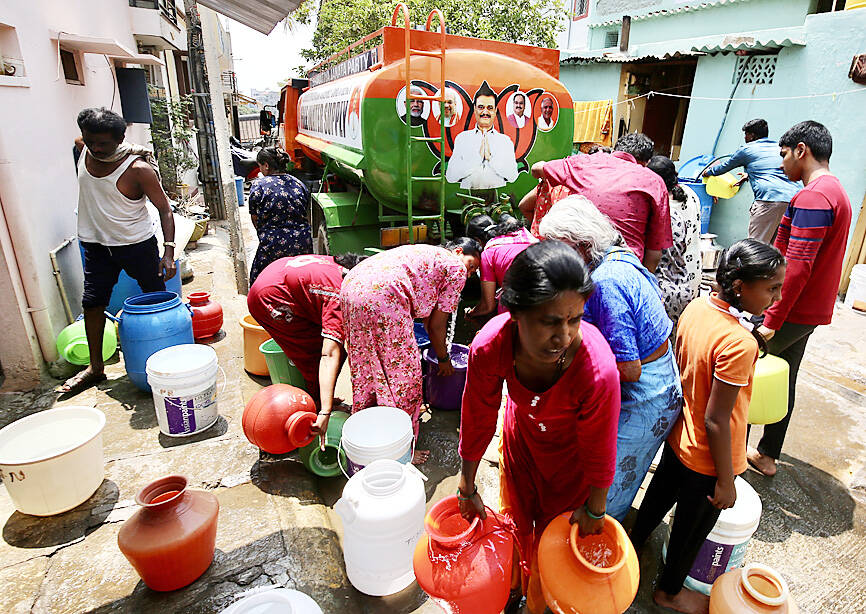India’s tech hub of Bengaluru is struggling with water shortages amid a drought, with the crisis expected to escalate as summer approaches.
Authorities are supplying water to residents in the city of 13 million people using tankers as a lack of rainfall dries up thousands of underground water sources. The Karnataka government has imposed a cap on how much the tanker suppliers can charge to prevent price gouging.
Bengaluru is home to the country’s US$194 billion information technology services industry. The crisis was a long time coming, said Shashank Palur, a Bengaluru-based hydrologist with the think tank Water, Environment, Land and Livelihood Labs.

Photo: EPA-EFE
“Bengaluru is one of the fastest growing cities in the world and the infrastructure for fresh water supply is not able to keep up with a growing population,” he said.
Indian cities have intermittently struggled with water shortages due to the over-use of groundwater and climate change causing a shift in the weather and reducing much-needed rainfall. With summer approaching, temperatures can climb to as high as 40°C, exacerbating the situation.
El Nino, a natural phenomenon that affects weather patterns worldwide, along with the city receiving less rainfall in recent years mean “recharge of groundwater levels did not happen as expected,” Palur said.
A new piped water supply from the Cauvery River, about 100km from the city, has also not been completed, he said.
Residents should use water “very judiciously” and for essential purposes only, Bengaluru Water Supply and Sewerage Board chairman Ram Manohar told a news channel earlier this month.
About a third of the city’s residents depend on groundwater, the Associated Press reported, citing authorities as saying some of the 13,900 wells in the city have been drilled to 457m.
About 7,000 wells have dried but authorities are making other arrangements, Karnataka Deputy Chief Minister D.K. Shivakumar said last week, adding that there is no crisis.
Identifying other sources and using them smartly, for example by reusing treated wastewater in the city “so that the demand for fresh water reduces,” could also help, Palur said.
Rapid urbanization has also contributed to the water shortage in the country. In 2019, Chennai in Tamil Nadu had a water crisis for weeks due to heatwaves and a bad monsoon in 2018.

In Italy’s storied gold-making hubs, jewelers are reworking their designs to trim gold content as they race to blunt the effect of record prices and appeal to shoppers watching their budgets. Gold prices hit a record high on Thursday, surging near US$5,600 an ounce, more than double a year ago as geopolitical concerns and jitters over trade pushed investors toward the safe-haven asset. The rally is putting undue pressure on small artisans as they face mounting demands from customers, including international brands, to produce cheaper items, from signature pieces to wedding rings, according to interviews with four independent jewelers in Italy’s main

Japanese Prime Minister Sanae Takaichi has talked up the benefits of a weaker yen in a campaign speech, adopting a tone at odds with her finance ministry, which has refused to rule out any options to counter excessive foreign exchange volatility. Takaichi later softened her stance, saying she did not have a preference for the yen’s direction. “People say the weak yen is bad right now, but for export industries, it’s a major opportunity,” Takaichi said on Saturday at a rally for Liberal Democratic Party candidate Daishiro Yamagiwa in Kanagawa Prefecture ahead of a snap election on Sunday. “Whether it’s selling food or

CONCERNS: Tech companies investing in AI businesses that purchase their products have raised questions among investors that they are artificially propping up demand Nvidia Corp chief executive officer Jensen Huang (黃仁勳) on Saturday said that the company would be participating in OpenAI’s latest funding round, describing it as potentially “the largest investment we’ve ever made.” “We will invest a great deal of money,” Huang told reporters while visiting Taipei. “I believe in OpenAI. The work that they do is incredible. They’re one of the most consequential companies of our time.” Huang did not say exactly how much Nvidia might contribute, but described the investment as “huge.” “Let Sam announce how much he’s going to raise — it’s for him to decide,” Huang said, referring to OpenAI

Nvidia Corp’s negotiations to invest as much as US$100 billion in OpenAI have broken down, the Wall Street Journal (WSJ) reported, exposing a potential rift between two of the most powerful companies in the artificial intelligence (AI) industry. The discussions stalled after some inside Nvidia expressed concerns about the transaction, the WSJ reported, citing unidentified people familiar with the deliberations. OpenAI makes the popular chatbot ChatGPT, while Nvidia dominates the market for AI processors that help develop such software. The companies announced the agreement in September last year, saying at the time that they had signed a letter of intent for a strategic